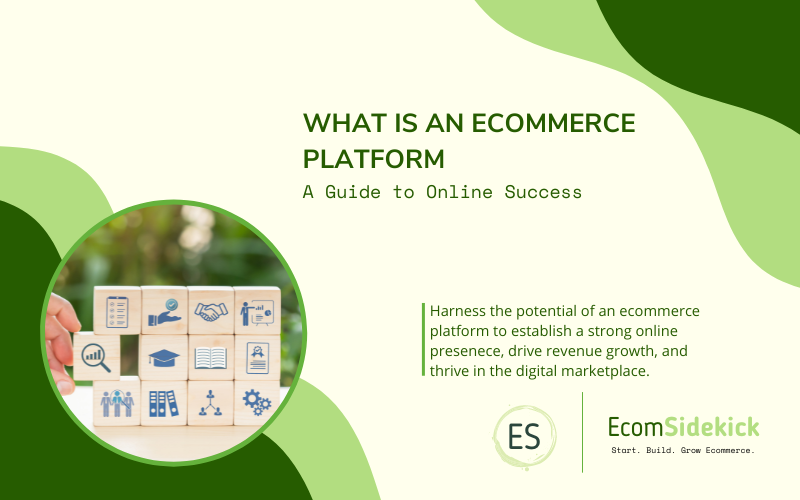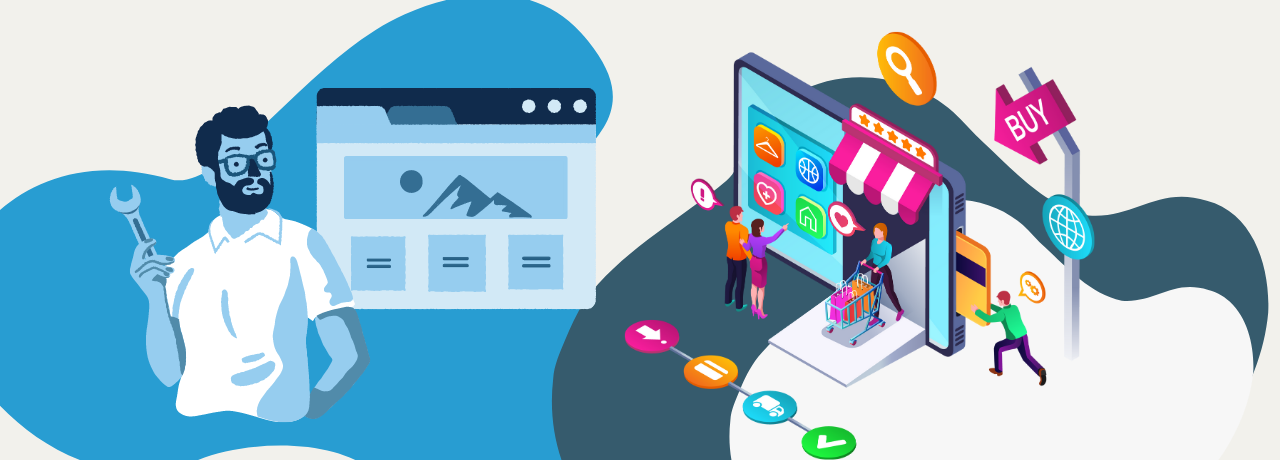What is the easiest way to start an online business?
An eCommerce platform is a software solution that helps businesses sell their goods or services over the Internet. But what is an eCommerce platform?

The platforms allow customers to browse through various categories and choose from a variety of items. Once they’ve found something they want, they click on the ‘add to cart’ button and proceed to checkout.
An eCommerce platform allows you to create a storefront where customers can purchase your products. There are several types of eCommerce platforms out there, such as Shopify, WooCommerce, OpenCart, etc. Each has its own unique features and benefits.
You should consider choosing an eCommerce platform that suits your business model and budget. If you plan to start selling online, then you’ll need a robust platform that offers great support and customer service.
What Is An Ecommerce Platform?
E-commerce is purchasing and sales activity occurring online. There are four main types of e-commerce: B2B, BtoB, C2C, and C2B. These terms refer to buying and selling activities taking place over the Internet.
The term “e-commerce” is used interchangeably with “online shopping.” However, there is some difference between the two. For example, e-commerce includes online marketing and advertising campaigns, whereas online shopping does not.
An e-commerce platform is a software application where both parties — the seller and the consumer — come together to play their roles.
In essence, a consumer should be capable of discovering products, shopping around using a cart, checking out, and paying without ever having to go anywhere else.
What Types Of Ecommerce Platforms Are There?
There are three main types of eCommerce platforms: SaaS (Software-as-a-Service), PaaS (Platform-as-a-Service), and on-premises.
SaaS (Software-As-A-Service) platforms deliver e-commerce solutions through online applications that operate over the web. These include tools such as Shopify, WooCommerce, Magento, and others. Also, Shopify makes it real easy to use page builders you wan to use.
They offer a variety of features including inventory management, marketing automation, shipping and logistics, customer support, payment processing, and much more.
With SaaS platforms, you don’t manage a physical server; instead, you use the internet to connect to a virtualized version of it.
This gives you access to all the same functionality as traditional hosting, without having to pay for extra resources and maintenance costs. You simply buy what you need and download the software onto your computer.
The downside of SaaS is that you lose control over your data. If there’s ever a problem with the system, you won’t be able to fix it yourself.
However, if you’re looking for a simple solution that doesn’t require too many technical skills, this might be the perfect option for you.
On-Premises E-commerce Solutions are hosted locally by the retail store and managed by their IT team, rather than being set up and operated by someone else. They are typically used by larger organizations that want more flexibility and customization.
For example, a large corporation could choose to host its e-commerce site on-premises because they prefer to keep full control over its data.
Or perhaps they’ve outgrown their current provider and need something that offers more robust features.
What Are Some Good Examples Of Ecommerce Platforms?

Wix
Wix is a user-friendly drag-and-drop site builder that offers customizable templates and web hosting. This tool makes it easy to set up a simple website without having to deal with complicated coding.
Plus, Wix provides great value for money and includes some useful features like eCommerce integration and mobile apps.
You can build a basic website free of charge, but you’ll have to pay to use Wix’s commerce features. For example, you can sell products through third-party sites such as Amazon, eBay, Etsy, and others.
As far as eCommerce functionality is concerned, Wix has a couple of helpful tools. These include tracking sales, accepting online payments, selling products on multiple platforms, and creating abandoned cart campaigns.
However, it lacks certain features essential for product-based businesses. For instance, it doesn’t offer inventory management, shipping options, or customer support.
Shopify
Shopify is, arguably, one of the best SaaS platforms for eCommerce. You can start small and grow big, and it offers everything you need to run a successful online shop, including powerful marketing tools, shipping integrations, and inventory management.
With Shopify, you can easily set up a multichannel storefront that sells directly through your site, at your physical location, on social media, and anywhere else you want.
And since Shopify takes care of all the technical stuff behind the scenes, you don’t need to worry about anything except what you’re selling.
Plus, Shopify includes over 100 premium themes to choose from, plus hundreds of free templates that are ready to go out of the box. You can even customize your theme to match your brand identity.
Shopify is designed to make managing your business easier and faster than ever. With their Business Command Center, you can track every aspect of your business from a single dashboard, add custom apps to automate repetitive tasks, and connect your entire team via Slack.
Wix |
| |
Shopify |
|
Browse these resources to help you choose the right platform for your business:
Final Thoughts
There are many different ways to create an online store, and each comes with its own pros and cons.
However, if you’re looking for a solution that will help you get started fast, then we recommend Shopify. It’s packed full of features and comes with tons of prebuilt templates and themes.
Frequently Asked Questions
What Is an E-commerce Platform, and What Does It Do?
An e-commerce platform is a software or a website that allows businesses to create and manage online stores to sell products or services to customers over the internet. It provides essential tools and features for product listing, shopping cart functionality, secure payment processing, order management, and often includes additional marketing and analytics capabilities.
How Does an E-commerce Platform Work for Businesses?
Businesses can use an e-commerce platform to set up an online store by choosing a template or design, adding products or services, configuring payment gateways, and customizing the store’s appearance. The platform handles the technical aspects of hosting, security, and payment processing, making it easier for businesses to focus on sales and customer service.
Are There Different Types of E-commerce Platforms Available?
Yes, there are different types of e-commerce platforms available to cater to various business needs. Some platforms are hosted and all-in-one solutions, like Shopify and BigCommerce, while others, like WooCommerce and Magento, are open-source and self-hosted, providing more customization options.
Paul Martinez is the founder of EcomSidekick.com. He is an expert in the areas of finance, real estate, eCommerce, traffic and conversion.
Join him on EcomSidekick.com to learn how to improve your financial life and excel in these areas. Before starting this media site, Paul built from scratch and managed two multi-million dollar companies. One in the real estate sector and one in the eCommerce sector.



